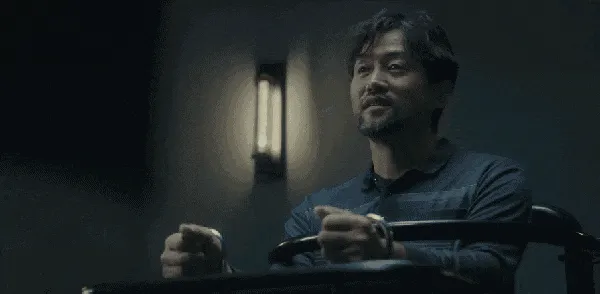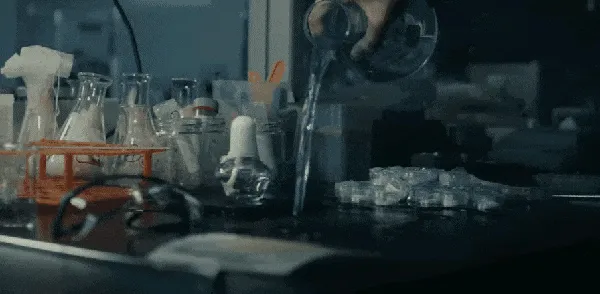It’s impossible to binge-watch 24 episodes in a single day… I’ve only skimmed through it, so today I’m going to talk about what makes this dark horse drama so special…
The finale of “Above the Clouds,” starring Sun Li and Luo Jin, just aired, boasting an extravagant cast. However, due to numerous plot holes and a dragging pace, it was met with widespread criticism.
Unexpectedly… the low-budget, 24-episode drama “Blind Spot,” quietly launched by a smaller studio, topped the trending charts within 4 hours of its release. It even scored an impressive 8.5 on Douban, becoming the biggest dark horse of the year!
Behind this phenomenon lies the most profound truth about the domestic drama market:
While capital only believes in traffic and IPs, truly good stories are using the “script is king” principle to teach the industry a harsh lesson.
The Disappointment of “Above the Clouds”
Before its premiere, everyone had high expectations for “Above the Clouds.”
Sun Li taking on the role of a female police officer, Luo Jin playing a suspect with both righteous and evil sides, and the bloody scenes of a dismemberment case in the trailer were even touted as a “new benchmark for the scale of domestic dramas.”
But what happened? As the plot unfolded, viewers realized that the drama was just a “delicate shell.”
Han Qing, played by Sun Li, would often have sudden flashes of inspiration while investigating cases, but the villains’ motives couldn’t stand up to scrutiny.
The unit cases looked bizarre, but were full of logical loopholes, ultimately relying on close-ups of dismembered bodies to cover up the narrative’s poverty.
However, the drama barely managed to maintain a passing score of 6.8, thanks entirely to the actors’ “hard power.”
Sun Li’s confrontation with Luo Jin in the interrogation room, a single glance was enough to make the pressure penetrate the screen.
Luo Jin perfectly captured the micro-expressions of a refined villain, even the act of wiping his glasses concealed hidden motives. Netizens joked: “If this drama had been replaced with a traffic star, it would have been torn to shreds long ago.”
“Blind Spot”: 24 Episodes of Non-Stop Thrills, A Murder Mystery Narrative

Compared to “Above the Clouds,” the script structure of “Blind Spot” is simply textbook-level.
The drama boldly “released all episodes at once,” weaving a precise web with three major cases.
Corpse Smuggling Case: An Explosive Opening
At a rainy car accident scene, five corpses are hidden in a refrigerated truck, with 400 packs of drugs buried underneath.
Medical doctor Leng Wenyu (played by Zhang Haoran), as the applicant for the corpses, is watertight during the investigation, but that night his laboratory catches fire and he dies mysteriously.
The police follow the clues to take down a drug manufacturing den, but the leader, Lao Jin, escapes in an explosion.
These opening 10 minutes directly raise two major suspense points: “Does the mastermind behind the scenes exist?”
“Is Leng Wenyu a pawn or a player?” The audience is instantly hooked.

The Female Forensic Doctor’s Revenge: Hidden Foreshadowing
Leng Wenqi (played by Wang Zhen) becomes a forensic doctor to investigate her brother Leng Wenyu’s death.
Five years ago, Leng Wenyu trembled in his last phone call, saying “Don’t trust anyone,” and the autopsy report showed that $2 million USD suddenly appeared in his account, matching the amount of the drug case.
Female police officer An Ying (played by Lü Xiaolin) warns her “Don’t investigate anymore,” and Leng Wenqi’s sinister gaze as she turns around hints that there is a deadly calculation hidden behind this sisterly alliance.
Rainy Night Black Car Case: Immersive Thrills
A young girl gets into a black car on a rainy night and is found the next day with her body covered in bruises and her arteries cut.
As the police lock down the driver, a new victim is still being held in a dark room. In the interrogation room, the murderer hums “Ye Lai Xiang” and taunts: “You’ll never find her.”
This cat-and-mouse game suffocates the audience, ultimately leading to the shocking connection between Leng Wenyu’s research on anti-cancer drugs and an organ trafficking group.

The Power of the Female Leads
The most subversive innovation of “Blind Spot” is the construction of a “dual female lead ecosystem,” which is rare in domestic criminal investigation dramas.
Lü Xiaolin: The Perfect Transformation from Forensic Doctor to Police Officer
She became popular for playing a female forensic doctor in “Day and Night,” and this time she transforms into a single mother police officer.
When facing drug dealers, her eyes are as sharp as a hawk; when being lectured by her teacher, she instantly becomes a “corporate slave mother” who bows her head and admits her mistakes.
In a chase scene, she ties up her loose hair with a hair tie while running, and the power of women instantly explodes.
Wang Zhen: A Deadly Player Under an Angelic Face
She initially appears as a weak and innocent flower, but is chillingly calm when performing autopsies. Her manic laughter when she discovers the password to her brother’s laboratory shows a seamless transition between three layers of acting.
Every conversation with An Ying is like a game, with knives hidden in her gentle tone.
The chemistry between this CP is beyond expectations.
In the dissection room, Leng Wenqi throws the autopsy report in front of An Ying: “The truth you think you know is just the blind spot the murderer wants you to see.
An Ying grabs her wrist in return: “Then what about you? Where is your blind spot?” This kind of tension-filled scene makes the audience exclaim that “this chemistry is more exciting than the male and female leads.”
Compared to “Above the Clouds,” which had an investment of 300 million, the production cost of “Blind Spot” may not even be a fraction of that, but it has achieved a dimensional reduction strike.
The drug manufacturing factory directly used the ruins of a real chemical factory as a location, Lü Xiaolin insisted on appearing without makeup, and the police station scenes directly borrowed from grassroots police stations.
Without exaggerated car chases and explosions, a vegetable market siege scene uses a long shot to show the life-and-death speed in the everyday life of the city.
The 24 episodes cover 3 main cases and 5 sub-cases, with an average of 2.3 key clues advanced per episode. There are no water-injected memories or redundant emotional lines, and even the end-of-episode easter eggs foreshadow the next season.
Leng Wenqi always collects soil samples at crime scenes, and it is not until the 18th episode that it is revealed that this is to match the special soil outside her brother’s laboratory;
The “black car uncle” in An Ying’s daughter’s painting is actually a psychological profile of the final BOSS.
“Script Alchemy” Defeats “Traffic Gold Alchemy”
The popularity of “Blind Spot” is by no means accidental, it has punctured the three major bubbles of domestic dramas.
- “Big IP + Top Traffic = Blockbuster” is a false proposition
This drama proves that a good story brings its own traffic. Lü Xiaolin’s Weibo fans exploded by 2 million in half a month, and the barrage collectively shouted “The entertainment industry owes this sister a Best Actress award.”
- Suspense dramas ≠ scale competition
Unlike “Above the Clouds,” which relies on dismemberment scenes to attract attention, “Blind Spot” uses social issues such as “anti-cancer drugs turning into drugs” and “organ trafficking dark web” to trigger deep thinking.
- Female characters break through stereotypical narratives
The dual female leads do not rely on male salvation, An Ying’s single mother status and Leng Wenqi’s revenge obsession show the complex spectrum of women in the pursuit of justice.
The screenwriter said in an interview: "We are just using 24 episodes to talk about three questions - Is the truth valuable?
Can obsession measure humanity? And when everyone is staring at the puzzles under the spotlight, the real evil is often hidden in the blind spots of vision."
This counterattack of a low-budget drama may be lighting a guiding light for domestic dramas.
Finally, what would the viewing experience be like if the actors in this drama were replaced by Sun Li and Li Xiaoran?